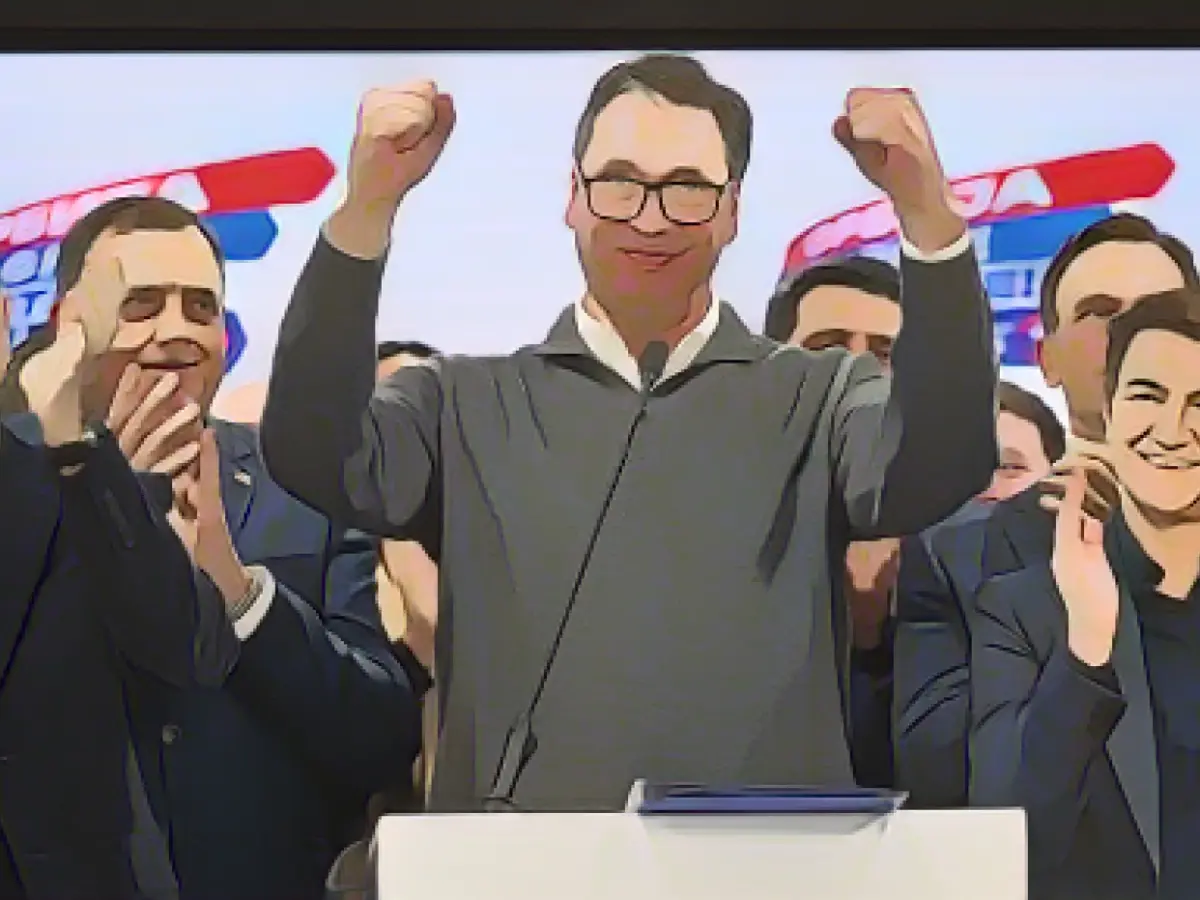Serbia's Ruling Party Presents a Strong Showing in Elections
According to polls from Ipsos and CeSID, Serbia's populous nationalist party, the SNS, is projected to secure an impressive 46.2% of the vote in the parliamentary elections. In a close second place, stands the opposition Serbian anti-violence league (SPN) with 23.2%.
Alexander Vucic, the leader of the SNS, expressed his delight with the predicted victory, remarking, "This is an absolute win that makes me happy."
Coming in third is the outgoing socialist foreign minister, Ivica Dacic, with 6.7% of the vote.
These elections mark the fifth set since 2012, taking place concurrently with local elections in most cities, including Belgrade and the northern province of Vojvodina.
The results for Belgrad's city council and mayoral race saw the SNS top the polls with 38.6% of the vote, while the opposition SPN took a respectable 35%. Belgrade, with its 1.4 million inhabitants, holds considerable sway as it boasts one of the most influential positions in Serbian politics.
CeSID and IPSOS pointed out several irregularities, including organized voter transport to polling stations, issues with the filming of ballots, and procedural mistakes.
Critics of the ruling party accused it of manipulation, charges that the SNS denies. The Serbian anti-violence group, which made the allegations, threatened to escalate the matter to the state election commission.
A total of 18 political parties and coalitions are contesting the 6.5 million votes and 250 seats in the parliament, with the elections threshold set at 3% of the vote.
Initial vote counts suggest that the SNS might hold a slim majority of at least 127 seats, which would allow it to govern alone, although a search for coalition partners to bolster its position in parliament is expected.
Recent developments in Serbia have included two mass shootings in May that left 18 dead, including nine children. This event sparked widespread protests and challenged Vucic and the ruling party's grip on power. Inflation reached 8% in November, exacerbating discontent.
Opposition parties and human rights advocates have levelled various accusations against Vucic and his political allies, including voter bribery, media suppression, violence against opponents, corruption, and ties to organized crime. Denials of these charges have been issued by Vucic and his allies.
According to the National Election Commission, a polling station observer from CRTA was assaulted in northern Serbia. Later, an individual was detained by police, but no further details were provided.
The newly elected parliament must convene within two weeks of the official announcement of the final election results. Within 60 days of that assembly, political parties have the opportunity to form a government.
As an EU candidate, Serbia needs to normalize relations with Kosovo, formerly an overwhelmingly Albanian province that declared its independence in 2008 after a guerilla uprising at the end of the 1990s. However, EU-mediated talks between Belgrade and Pristina have stalled, and tensions remain high.
Serbia must also crack down on corruption and organized crime, liberate its economy, and align its foreign policy with the EU, including imposing sanctions against traditional ally Russia due to its military adventurism in Ukraine.
Sources:
Enrichment insights:
- Allegations of irregularities and voter manipulation have sparked international concern, due to Serbia's status as an EU candidate country.
- Critics, including the European Union's election observer and the U.S. State Department, have expressed their concerns and called for a proper investigation into the alleged irregularities.
- Opposition parties and human rights activists have levelled various accusations against the ruling party, including voter bribery and media suppression, which are inconsistent with Europe's democratic norms.
- EU commissioners have called upon Serbia to significantly improve its electoral process, acknowledging that the proper functioning of its democratic institutions is crucial for its EU accession process.
- The OSCE and its international observer mission reported instances of violence and procedural irregularities, along with allegations of organized voter transport and vote-buying.








